Untranslated Korean Title / Untranslated Korean Artist
via Lovefingers (06.29.09 - Fingertrack 898)
November 28, 2009
Postscript (Sick-Disco)
Posted by
time warner cable
0
comments
![]()
August 30, 2006
The Ax
Here or now or both WPNOB comes to a close. Feel free to read, but only some of the old MP3 links will work. Bye!
Also: check out the new site at Yr Cover's Blown and the partial WPNOB Archive.
Posted by
time warner cable
1 comments
![]()
August 24, 2006
The Elemental Backstroke
MP3 The Elements / Tom Lehrer
Dance to this song in the crevices of the Museum of Science and Industry.
Plus: a neat animated version that reminds me of Young-Hae Chang's work with Gil 'n' Sullivan's "Major General's Song" substituted the for hard bop.
Posted by
time warner cable
5
comments
![]()
August 19, 2006
The End Is Fast Approaching
MP3 Chinese Farmer / The Ten Speeds
Left Seoul and returned to the States, so WPNOB will retire in a few short days, though the content will remain online. If all goes according to plan, this is the second-to-last post. As a courtesy to circles, it's a song by the mildly-Korean rockers The Ten Speeds, whom I wrote about at the very beginning.
Read the first banana note here. Read the last one soon.
Posted by
time warner cable
1 comments
![]()
August 17, 2006
Spooky Action at a Distance
MP3 Collapse Coming On / Decoder Ring
Hospital room and a sound building into Einstein's final words lost in German on the ear-rims of his nurse She the only person present when he died And if they don't speak your language then you're with no one whispering wordlessly across the infinitesimal in-betweens Nothing normal at distances like these
From Spooky Action at a Distance, 2002; courtesy Juliet.
Learn and buy at this site or that site.
Posted by
time warner cable
0
comments
![]()
August 16, 2006
Murakami: Pinball, 1973
...qe interrupt our regularly scheduled programminq... with a digital copy of Haruki Murakami's out-of-print second novel, Pinball, 1973... courtesy a wonderful Frenchperson dealing in contingences...
...a nameless narrator predicts sandboxes, reads Critique of Pure Reason in bed, has his story interrupted by the Rat, describes the humble Hitler-esque origins of pinball, and sleeps with twin girls named 208 & 209.... the catenae are one, two, three...
PDF full text of Pinball, 1973
read about Pinball, 1973
buy Pinball, 1973 ($400 to $3,000)
Posted by
time warner cable
2
comments
![]()
August 15, 2006
It is made of fifteen pieces, and this is...
a mix of bits for the outdoors.
MP3s It Is Made of Fifteen Pieces / Various Artists [95 MB]
1. Untitled #3 / Wooden Spoon, and this is the frontispiece.
2. The Mop / Shugo Tokumaru, and this is the fiftycent piece.
3. Great Day (inst rmx) / Four Tet & Madvillain, and this is the showpiece.
4. No Form, No Food, No Future / My Dad vs Yours, and this is the nopiece.
5. Data.Vortex / Ryoji Ikeda, and this is the timelesspiece.
6. Safe As Milk / Hopewell, and this is the mantlepiece.
7. Great Release / LCD Soundsystem, and this is the unconversation piece.
8. Girls / Death In Vegas, and this is the basic codpiece.
9. First Period / Rei Harakami, and this is the period piece.
10. Bijoux / Manitoba, and this is the fancy neckpiece.
11. White Film / Tujiko Noriko, and this is the missing piece.
12. Whirr / Fonica, and this is the re-piece.
13. Super Good / Boredoms, and this is the non-centerpiece.
14. On The Roof / Raccoo-oo-oon, and this is the penultimate piece.
15. I Saw A Dolphin / Psycho-Baba, and this is the final piece.
Posted by
time warner cable
0
comments
![]()
August 14, 2006
It is made of fifteen pieces, and this is the fancy neckpiece.
MP3 Bijoux / Manitoba
(from Up in Flames, 2003)
Posted by
time warner cable
1 comments
![]()
August 2, 2006
The Go! Team is so 2005
Let's Make Love and Listen to Death from Above / CSS
Music Is My Hot Hot Sex / CSS
Cansei De Ser Sexy—five hot electroclash Brazilian girls and one kinda-studly boy—were the only truly worthwhile moment of the 2006 Pitchfork Music Festival. Their album doesn't work as well as their performance because the singer can't hop out of your computer and toss her digits into the crowd, but here at least are two hints of why their live show is so damn tiring.
Posted by
time warner cable
0
comments
![]()
July 8, 2006
Time, That Tasty Donut: 4 Convolutions of Jackson 5
Time: The Donut of the Heart / Jay Dee [2006]
All I Do Is Think of You / Troop [1989]
All I Do Is Think of You / Jackson 5 [1975]
In 1989, this was unthinkable. Sure, an aspiring R&B boy band might cover a Jackson 5 tune to flesh out their sophomore effort with a third single, but who, without the assistance of strong psychotropic drugs, could imagine a Korean post-rock band covering an American instrumental hip-hop track that reworked said Jackson 5 tune? (Not me, I was 7 years old.)
The result is impressive, musically speaking. But it's also more than that. Bulssajo's version of "Time: The Donut of the Heart" is a neat example of the way that American culture is/was digested in Korea. In general, one expects certain Western styles to emerge in Asia second hand. Korea opened to the West in the '90s and thus, to oversimplify, received both Jackson 5 and J Dilla simultaneously. Much of popular American culture was consumed vertically rather than horizontally. Take punk rock for example.
In 1998, Tim Tangherlini, Professor of Asian Languages and Culture at UCLA, went to Korea to explore the emerging punk rock scene. The result was a documentary, Our Nation: A Korean Punk Rock Community and a solid scholarly article, Anarchy in the UK, Solidarity in the ROK. The following is an excerpt from an interview with Tangherlini conducted by Meg Sullivan.
Tangherlini was particularly fascinated by the speed with which a single culture was digesting a whole musical tradition — albeit a contemporary one. Thanks to the liberalization of restrictions on rock music, nightclubs and foreign travel, the Internet and such music file-sharing services as Napster, South Korean youth in the 1990s enjoyed unfettered access for the first time to foreign rock, he explained.The corollary of this phenomenon is that if you're a Korean punker you needn't cite The Clash as an influence if you actually like Green Day better. A recent New York Times article included a quote from a young girl describing China, in it's love of Korean pop culture, as not postmodern enough for Sex and the City. I'd argue that Korea, and possibly urban China as well, has leapt straight over post-modernity into a phase outside time: meta-modernity. (The grad school bs-ing has officially begun.)
“They got all of punk rock history at once — the Sex Pistols, the Ramones and Nirvana,” Tangherlini said. “It was like being in London or New York in 1978 and Seattle in the mid-80s, all at the same time.”
In this leap—a moment and an eternity—Green Day becomes The Clash. And this de-emphasis on originality, or "date of origin," is not limited to the sphere of popular music. Take fashion for example. If you grew up in Korea and first encountered ripped jeans in the late '90s, the difference between wearing through a pair of Levi's yourself, buying a pre-worn pair from a thrift store, and buying a pre-torn pair from Urban Outfitter's is minimized. It's much harder to argue for the authenticity of any particular band or style if you receive all bands and styles at once. After all, what does time matter if it's just a donut, if it just loops around on itself?
At the same time, you can't simply plead ignorance. Bulssajo represents a thoughtful approach to embodying the vertical consumption of culture, an approach that creates new possibilities ("make[s] it new") by paying attention to details. Their Jay Dilla cover suggests that when the donut of time is squashed, when a song's sections, intro and chorus, are folded together, when music history is compressed into a single moment, the original guises of authenticity (older, rarer, etc.) cease to be important. International borders disappear when everything good is everything to everyone.
Selecting a genre, or a history of influences, also becomes less important. Bulssajo's guitarist, who DJ's in his free time, is influenced equally by JD and the original J5; the band itself equally by Yo La Tengo and Velvet Underground. Unburdened by the history of western music, they aren't ashamed of the recency of their idols. And by condensing them all to a single point—by mixing rather than layering—they have no trouble looking fit to eat two dozen more while downing the entire first donut in a single bite. An infinite, and grossly beautiful, eating contest of sorts.
More Bulssajo here.
Posted by
time warner cable
1 comments
![]()
May 28, 2006
The Best Jeff Tweedy Show Ever: 2002-06-10
The only thing to do after making a list is to make another list clarifying why the top-ranked this or that is so top-ranked. In the case of the episode of the Amazing Spectulariffic Jeff Tweedy Traveling Variety Show from June 10, 2002, the answer is simple: This one just has everything.
1. a Thax Douglas intro featuring Boris Grebeshnikov shout-outs and two poems, one of them not half-bad (see below)
2. Tweedy coughing along to the opener, "I'm a Wheel"
3. good audience rapport: "You guys are being really nice already..."
4. bad puns: "I'm really hot... [Should we] turn the fan on?... I'm trying to turn the fans on, man!"
5. a great setlist featuring the likes of "Spiders (Kidsmoke)," "Please Tell My Brother," "Hesitating Beauty," "Pecan Pie," "Be Not So Fearful," "Acuff-Rose," "Jesus, etc.," etc.
6. a rare cover of "Henry & the H Bombs" by Mott the Hoople
7. the best version of "New Madrid" to date
8. the word "penis"
9. a Stan-the-sound-guy story
10. "Passenger Side" as a drunken sing-along closer
Jeff Tweedy live links
-at The Abbey, Chicago, 2002-06-10 (full concert)
-at The Vic, Chicago, 2003-01 (three highlights)
-at Mandel Hall, Chicago, 2006-02-25 (full concert)
This Setlist
Jeff Tweedy
2002-06-10
The Abbey
Chicago, IL
1. [thax douglas intro]
2. i'm a wheel
3. spiders (kidsmoke)
4. someone else's song
5. i'm the man who loves you
6. [talking: she's got a penis]
7. sunken treasure
8. i am trying to break your heart
9. pick up the change
10. please tell my brother
11. heavy metal drummer
12. [talking: in the house]
13. when the roses bloom again
14. hesitating beauty
15. california stars
16. henry & the h-bombs
17. [talking: ian hunter]
18. we've been had
19. casino queen
20. [talking: the classic rock section]
21. pecan pie
22. be not so fearful
23. [applause]
24. [talking: stan]
25. was i in your dreams
26. acuff-rose
27. war on war
28. jesus, etc
29. reservations
30. new madrid
31. passenger side
Boris Grebeshnikov
by Thax Douglas
Eventually a carp will cover the exact entire bottom of the lake
like stars plugging up the holes in the sky, but which carp?
The rest of the carp might start feeling intense
pre- or post-nostalgia for the dirt or the air
so strong that the hard-livered gills, etc. are like little kids
who want to grow up to be actors instead of solid reliable organs.
But the carp at the bottom will keep the lake fresh and clean
with the millions of gills shivering over its body.
Posted by
time warner cable
4
comments
![]()
May 23, 2006
He walks home with a carton of white peaches / Held high on his should like a badge.
Peach / Otomo Yoshihide's New Jazz Ensemble
Parallel / Metal Tastes Like Orange
Japanese free jazz conspirator Otomo Yoshihide recently performed in Seoul with Sachiko M, Sato Yukie, and Joe Foster. Above are two highlights from his career. The first is a dirty waltz through half-deserted streets and past unmoving bodies. The second, from Secret Recordings 1, is straight noise. Plus saxophone.
Posted by
time warner cable
0
comments
![]()
iTunes Chronology & the iTunes Word Game
Breakfast / All of My Brother's Girlfriends
Breakfast in NYC / Oppenheimer
The world of wires has, of course, changed the way music is made, distributed, and consumed. But it's also changing the way musicians live, writes Chris Dahlen, the best Christopher Pitchfork writer since Chris Ott. There's an awful lot of fancy stuff you can do with a computer and a bunch of music files, he continues. You can keep track of your listening habits, make your own mash-ups and remixes, get recommendations from people or machines you don't even know, and automatically generate mixes to fit your mood. Moreover, if you have a nice computer and a degree in computer science, you can even analyze online music reviews. Pitchformula, the brainchild of Loren Jan Wilson, creates wordlists by scouring the database of reviews available at Pitchforkmedia.com and ranking key words like "guitars," "dissonance," "frenetic," and "warmth." The first goal of this project was to demonstrate the limitations of critical language in describing pop music. (Check it out yourself by viewing Pitchfork through Wilson's filtering program. Predictably "positive" words appear in green and "negative" ones in red.) The second goal was to use the words with highly positive connotations to select criteria for writing songs that would score well with reviewers. Despite this careful work, unsurprisingly, the songs that Wilson ended up producing for this project are far from 5-star material. Much better are those he'd already written, freely, for his band Starlister, which hails from Hyde Park, Chicago, and has recorded a number of decent cuts, including The Deepest Color of Your Hazel Eyes.
The gap between Wilson's "real" songs for Starlister and his "homework" songs speaks to the obvious conclusion that both he and Dahlen reach: There's an unidentifiable "mystery element" that makes certain songs and albums great. Call it luck, fate, passion, sweat, creativity, heart, or feeling. Whatever you dub it, its defining feature is that it's not open to analysis. Anyone approaching music without considering this fact is missing the point. Computers can probe all they want, and musicians can try their best using electronic wizardry to satisfy snarky critics, but there's ultimately more to music than that. Nevertheless, computers can assist us to better appreciate and better analyze songs. In fact, they often help us the most when they keep it old school. Computers are best at improving our daily lives when they're used in relatively simple ways: for e-mail, for playing music and movies, or for finding the address of a restaurant. Think Number Munchers and Crystal Quest.
Maybe all this background is obvious. Complex statistical analysis doesn't help your average indie fetishist, and music isn't just ones and zeros. The point is, there are fantastically simple things that can be done with songs and computers. Simpler than Last.fm, and simpler than AppleScripts. Below are two blue-collar iTunes tricks that can help spur new interests and new connections. Both, hopefully, can make things a little more interesting without sacrificing the elements of chance and creativity. Either way, they're easy and we can pretend they're important.
1. History of the World in Song: iTunes Chronology
Recently, I met a guy who is truly obsessed with iTunes. He's one of those folks who must have artwork for every album and spends hours carefully delineating genres. Anal but not abnormal. The thing that surprised me about this guy was that he organized his entire music library by album. That is, all his albums were in alphabetical order, leaving The Immaculate Collection right alongside The Low End Theory and Let's Get It On alongside Let It Be and (more appropriately) Let It Be... Naked. I found this amusing. I found this foolish. But to him it was genuinely more important to have all the songs from compilations and soundtracks next to one another than it was to have all of the albums by a particular band grouped together.
I disagree with my friend's organizational approach, but I applaud his dedication. And I thank him for forcing me to reconsider how I was using iTunes myself. After our encounter, I immediately realized that I wanted my albums in chronological order by band. The solution was simple: place the recording or release date before the album title (e.g. 1997 Handsome Western States). Now each musician in my music library has his/her/their catalogue neatly organized like a timeline. 1997 Handsome Western States comes before 1999 When Your Heartstrings Break, as it would have in your average iTunes library, but they also both come before 2001 The Coast Is Never Clear. A little difficult to explain, but easy to grasp visually: Take a look.
Of course all this is as stupid as it is obvious, but once you organize your music in this way everything is put in perspective. Hundreds of connections and concatenations reveal themselves. You have the intense satisfaction of being reminded—every time you listen to it—that Blood On the Tracks was released a full ten years after Bringing It All Back Home. Then maybe you remember that the "blood" is symbolic of the end of Dylan's marriage to Sara Lowndes. You also realize what sense it makes, historically, that 1969—that year of endings that followed the assassinations of MLK and Robert Kennedy and saw the death of the counterculture movement—was the year of the last true Beatles release; the year in which the Kinks put out an album with the phrase "decline and fall" in the title; and the year of Nashville Skyline, a continuation of Dylan's return to acoustic Americana and away from politicizing his music. It suddenly makes perfect sense that the Velvets released Loaded at the beginning of the "Me Decade," and that Brian Eno retreated into the studio and focused on electronica halfway through that same decade. Seeing the years alongside the album titles reminds you that every piece of music—no matter how great it is, no matter how much it transcends time—falls into a history of events, of people and of places. The '70s become the '80s as Joy Division becomes New Order. Sonic Youth, born in 1981 and debuting in '83, grows up alongside you, through the fall of the Berlin Wall and through the fall of the World Trade Towers. Today, SY lives on—a twenty-something finding new ways of doing old things—while R.E.M. and U2 turn decrepit and senile. Sure everything's in its right place, and time and seasons and bands turn. But everything turns at its own pace. The interesting part is connecting the dots and comparing those paces.
2. Searching for the Perfect Mix: The iTunes Word Game
The other iTunes trick is not so heavy. It involves trying to find words or phrases that will create mixes. The idea is simple: You type a word into the search box in the upper-right corner of iTunes with the goal of making a mix of reasonable length—between 30 and 80 minutes, say. Words like "chicken" and "arrange" work reasonably well for me (40 and 33 minutes, respectively). So do the phrases "all days" and "new time" (44 and 30 minutes). Words like "love," "change," and "dreams" don't fair so well, producing mixes that would require an entire spindle of CD-Rs to burn. Words like "fish" and "stereo" fail for another reason: too many songs by the same artist (I get all of Fishscale and all of Swordfishtrombones, all of Apples in Stereo and all of Stereolab). And words like "apostrophe" and "challenging" are just too clever (I get nothing for either). Basically, you have to find words that are interesting enough to be used but not over-used. Part of the fun is being better than your friends at finding the right words. And part of the fun is seeing just how weird your music collection is (I get hits for "children die," "wise cousin," "onion necklace," "jollity dog," and "inside hippo"). But, of course, the real goal is to find the perfect word or phrase, the one that selects a 79-minute mix with no repeats.
I have yet to nail a 79-point bull’s-eye, but a recent favorite discovered through the iTunes Word Game is the "Breakfast Mix," which includes 11 songs, features 10 bands, clocks in at 30'34", and starts with an instrumental track. The two tracks posted above are from young breakfast-loving bands that are using the internet to reach an international audience: All of My Brother's Girlfriends is from Sweden, and the more polished Oppenheimer is from Ireland. Thanks to Chris for introducing me to the latter.
1. Breakfast With Blockhead / Aesop Rock
2. Breakfast / All Of My Brother's Girlfriends
3. 40 Oz. For Breakfast / Blackalicious
4. I Am The Milkmaid And I Bring Your Breakfast In / The Blow
5. Orange Juice Blues (Blues For Breakfast) / Bob Dylan & The Band
6. Raining Rage / Breakfast
7. Breakfast Eat Rice / Breakfast
8. Finish Your Collapse And Stay For Breakfast / Broken Social Scene
9. Breakfast At Tiffany's / Deep Blue Something
10. Breakfast Cake / The Lovely Feathers
11. Breakfast In NYC / Oppenheimer
Posted by
time warner cable
1 comments
![]()
May 21, 2006
Their Skin Was Made of Ice-Cream Trucks
Claudine / The Bats [1985]
Claudine / Sambassadeur [2006]
It seemed impossibly unlikely that these Swedes would ever release anything else as good as their first single, "Between the Lines," but their latest EP dispels this unlikelihood and proves Sambassadeur at least as gifted as The Concretes. Both "Claudine" and "Kate" are tired from running through heads all day. (Go here to download "Kate" and purchase Coastal Affairs.)
Posted by
time warner cable
0
comments
![]()
May 20, 2006
No Radio: Stars, Wars, Cures
Turn the Radio On (live) / Jude
No Radio / Dirty on Purpose
The first song's about needing distractions ("We got so high we stop pretending / That you and I were never-ending / And it's a long way home / Turn the radio on"); the second's about being so happy you don't need anything. Some nights things are all wrong—off in metaphysical sense—and yet you wake up and everything's just right again. Sure, "there are places we have never been," but that doesn't matter for Brooklyn superstars Dirty On Purpose because "the sun came up" and Hallelujah Sirens (2006) is coming out.
Next door: Two penguins are in a communal shower. One says, "Excuse me, could you please pass the soap?" The other stares at the first and replies, "Nooo, no radio!"
Posted by
time warner cable
1 comments
![]()
May 18, 2006
Put on your spurs; dance; make Wes Anderson jealous.
La Moda / Ennio Morricone [from La Donna Invisible OST, 1969]
Holy shit. Thank you, Adriane.
Posted by
time warner cable
0
comments
![]()
May 16, 2006
Raining Electrons and Cigarettes
 Goodbye / Asobi Seksu [2006]
Goodbye / Asobi Seksu [2006]
Close Watch / Theta Wave State [2002]
Asobi Seksu is not inexperienced. They’ve been around in some form since 2002, and their name means "playful sex" in Japanese. Yet "Goodbye" sounds as if it were recorded during that period of early adolescence when you knew "sex" was an important adult word but were still uncertain exactly what it meant. "Goodbye" is young for its age. It's the jangliest, most Belle & Sebastian track on AS's forthcoming sophomore effort, Citrus, even though it lacks BS's melted-Toblerone-under-your-dress perversity.
Citrus itself is strongest at these types of moments, when the band pushes its inclinations toward the extremes. If "Goodbye" is the condensed sweetness at the center, the bit that gets stuck in your teeth, then the preceding track, the eight-minute "Red Sea," is the distilled border, with chords and macromolecules floating off the skin and out into space. It's last five minutes recall the band's previous incarnation as Theta Wave State, particularly the quiet "Close Watch," the only TWS track to feature Yuki on vocals.
Go here for the Music For Robot's post on Citrus, and here for Colin's post on Asobi Seksu's first album.
Posted by
time warner cable
0
comments
![]()
May 15, 2006
The king made a brief appearance to announce tourism.
How To Lie / Shushshush
If I still bought albums the same way I did in middle school, I'd probably end up owning Shushshush's forthcoming debut and listening to it with as much frequency as Rubberneck, Pet Your Friends, and Breathe. Or not. Maybe, just maybe, everything will fall into place for Shushshush and they'll manage to continue embodying only the best elements of their Phantom Planet-ness. Or maybe next time they'll spurn "You possess a sugar-filled neck" in favor of its soundalike: "You possess a sugar-free neck." No matter the future, "How To Lie" is satisfying, and the best moment on the strangely unimpressive Music For Robots compilation. Occasionally, when the questions seem most elusive, power pop is the only answer.
Despite the weak comp, MFR itself is the shit. Check out the new track from Asobi Seksu.
Posted by
time warner cable
0
comments
![]()
May 11, 2006
Rural Psychogeography
Kahn was recently in Seoul, playing at Relay ("a series of collective perfomances of media art presented by SLOWALK"). He stormed out obtrusively mid-performance, apparently after becoming upset with the work of one of his improvisational collaborators. Dude was using samples or some shit—samples! What a fool. Point is JK takes this stuff seriously but has the goods and good taste to back it up. You can read his thoughtful survey of the Relay scene here. Coincidentally, this weekend is huge for Relay, which will be featuring Japanese noise superstars Otomo Yoshihide and Sachiko M. Come with boobs and a Sharpie.
"Sihl 4" is from 2005's Sihl, named after the river in Zürich. "Timelines 3" is from 2005's Timelines. Kahn's site has tons more free sounds.
Posted by
time warner cable
0
comments
![]()
April 28, 2006
At Home with the Groovebox
 Today I Started Celebrating Again (alt) / Will Oldham
Today I Started Celebrating Again (alt) / Will Oldham
Dude's cover of RK's "Ignition" is atrocious. And dude blew in the DJ tent at Intonation last summer, where he demonstrated nothing except the high irony quotient of his iPod library. But none of that means Oldham can't get down.
"Today I Started Celebrating Again" is the single moment of brilliance on an otherwise mediocre 1999 compilation that highlights the tricky magic of The Groovebox. A reference to Merle Haggard, gentle grooving pops, and "I am drinking again" are more than enough to start this party. Barring Jim Guthrie's "Who Needs What," I can't think of a song so quiet that makes me want to dance so bad. Think overweight and white; think a Bud in each hand; think John Travolta just barely moving on the dancefloor at Jack Rabbit Slim's. Think DANCING in the mirror.
I'm on vacation for a week. This is the celebration.
Posted by
time warner cable
0
comments
![]()
April 23, 2006
Dating Advice from the Smarter Sex
The Worrying Way / The Fabulettes [dead link]
Tip #103: Date a philanderer, and all the worrying you do will subtract pounds, especially from your hips. (Thanks to Naomi.)
Dicks Don't Grow On Trees / Robyn Archer [new link]
Tip #009: If you're attracted to penis, you should date a male animal. (Thanks to AQ.)
This second tune comes from the incredible 365 Days Project at Ubuweb and is jam-packed with astounding facts...
Fact: I know that you could root, root, root with a well-made Japanese substitute / But I realize you'd rather have the real thing / Woo! Give me that ping!
Fact: There ain't no cock trees, prick trees, or dick trees.
Fact: You'd be lucky if you get one dried-up old scrotum.
Posted by
time warner cable
2
comments
![]()
April 21, 2006
No Junk No Soul?
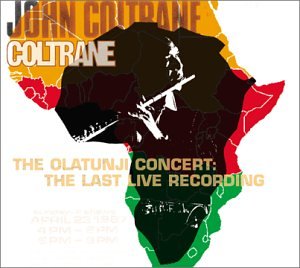 MP3 My Favorite Things (live) / John Coltrane [31.7 MB]
MP3 My Favorite Things (live) / John Coltrane [31.7 MB]
Yesterday I went to a traditional shaman ceremony in northern Seoul. We saw the 75-year-old North Korean woman who started the shaman resurgence in Korea in the 1970s. We saw a possessed shaman in drag dance on a giant knife blade. We saw a woman who'd hired shamans for a private ritual get pelted with rice and beans. And we saw voodoo-like dolls being made to scare evil spirits away from the real bodies of children.
Those were the highlights. But the one thing you don't really notice until it's gone, the one thing that truly matters, is the music. Whenever the music stops, the sacred quality of the rituals dissipates almost entirely. Without the incessant rhythms and the simple melodies, the magic just isn't there. My favorite instrument was the "taepyongso," which sounds like a stunted oboe crossed with a recorder. That is, like the alto sax in free jazz. It's riffs sound like Ornette Coleman or Albert Ayler even when they're entirely harmonious.
This version of "My Favorite Things" is from Coltrane's last live recording, from one of the two shows he played in Olatunji, Africa, in 1967. There's no alto here, but the song still reminds me of the taepyongso, if only because it's as primal as can be. In "Brian the Bachelor," a season four episode of Family Guy, Brian and Brooke bond over "early Coltrane, before he got clean." Brian comments, yeah, yeah, "no junk no soul." But that is bullshit. Listen to this song and tell me Coltrane has no soul at the end of his career in '67. Sanders and Coltrane both sound as if they're punishing their own enormous spirits—trapped deep inside their instruments—until they scream cries and are freed. Only for the briefest moments does any of this maniacal 34-minute trip resemble "My Favorite Things," and the only one who needs junk to take it is the listener. This is not for the faint of heart. This is for someone with a desert or two and not much else.
John Coltrane, soprano, tenor saxophone; Pharoah Sanders, tenor saxophone; Alice Coltrane, piano; Jimmy Garrison, bass; Rashied Ali, drums; Algie Dewitt, bata drum; probably Jumma Santos, percussion
Also: Check out Armrest, a music blog that thoughtfully analyzes the way specific contemporary songs borrow from their ancestors.
Posted by
time warner cable
2
comments
![]()
April 20, 2006
The Stereotypical Furniture Mover
Thin Blue Flame / Josh Ritter [2006]
I am seated at the DWM table with George Washington, Babe Ruth, Dean Moriarty, and Chris Farley. Only one of us is unreal; the rest are dead. There are pitchers of cold beer, shots of whiskey, and tobacco. Washington remarks that he got plastered only two days earlier.
Our hands are dealt by someone famous whom I don't recognize. He might be Greek or a writer. Either way, I see nothing good all night except once, full of spades. We drink and lose our money to the Babe. He reaches over to sweep in the pot, and his gut creases against the tabletop. Farley does a great impression.
I've never heard so much bullshit spoke in one night. Dean stands up occasionally, as if to leave, only to remember through the haze of alcohol that his car is in the shop. He smacks the dealer on the back each time, returns to his seat, and asks for a set of ladies. More material for Farley, for everyone.
By the time we finish our third bottle of Jack the laughing begins to slow. Soon we stop talking entirely. The music picks up, and the rest of the people in the bar are, for the first time, really there. The radio hangs above the mirror and the bottles. It should be "Desolation Row" but it isn't. We look over and notice a machine making special air next to the speakers. Air that makes it so you don't need tragedy for meaning.
This is heaven. They have that here.
Posted by
time warner cable
0
comments
![]()
April 18, 2006
They removed the front of my eyeballs and stitched them to my upper back
Debaser (Pixies cover) / Feed
Covering a song like "Debaser" is a waste. Bands should cover "Emulsified" and "Why I Hated August 93." Bands should cover "Let's Talk About Spaceships" and "Federal Dust." Bands should borrow greatness only when they're playing live. Bands should leave those versions unreleased.
Bands should mutilate greatness so far it's turned inside-out, returning to somewhere neither of them have ever been before. Bands should undergo surgery for the good of the nation. (Bands should glue their brains to the ceilings of their skulls.) Bands should try to marry other bands by screaming "I love you I love you I love you," in other words.
Bands should do this, precisely. This is a terrible beauty. The first two minutes are a declaration of love. At 2:01, it sounds like "Karate Feelings" will start playing. Then two minutes more: Frank Black on bottom?
Posted by
time warner cable
0
comments
![]()
April 15, 2006
Don't Talk to Me About Gene Hackman
Top 10 Songs Titles Since 1998
10. They Are Night Zombies!! They Are Neighbors!! They Have Come Back from the Dead!! Ahhhhh! (Sufjan Stevens, 2005)
9. Get the Fuck Off My Cloud (Blood on the Wall, 2005)
8. Vikings Invade the Mediterranean But Don't Leave (Prefuse 73, 2002)
7. I'm Getting Back Into Getting Back Into You (Silver Jews, 2005)
6. If You Shoot the Head You Kill the Ghoul (Jeffrey Lewis, 2003)
5. Judy Is a Dick Slap (Belle & Sebastian, 2000)
4. Me and Jesus the Pimp in a '79 Granada Last Night (The Coup, 1998)
3. Halfway to a Threeway (Jim O'Rourke, 2000)
2. Fuck Yeah, That Wide (Local H, 2003)
1. Don't Talk to Me About Gene Hackman (Robyn Hitchcock, 1999)
Not a very diverse list, I realize. Whatever, maybe lame white boys are genetically predisposed toward being more interested in the names of their songs than the songs themselves. The winner is one of the two hidden tracks (has anyone done a full album of those yet?) from Jewels for Sophia. Except for The Coup track, it's also the best piece of music on the list. The audience laughter is annoying, and Hackman doesn't deserve to be a source of mockery (Robyn: You seen The Conversation??), but I like it when he calls a coke a "bottle of pop."
Sufjan Runner-Up: Year of the Asthmatic Cat
Posted by
time warner cable
1 comments
![]()
April 14, 2006
Mr Robot Yr On Fire Mr
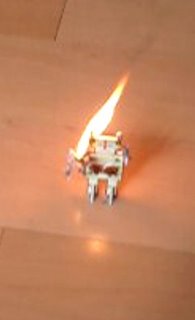 La Nuit / Robots in Disguise [2005]
La Nuit / Robots in Disguise [2005]
It's kinda weird that when someone tells you disguised mod-squad femme-bots are coming to take over the universe, you probably think, "Yeah, like that's never been done before." Whatever, if Robots in Disguise can make more dance songs like this, they can be forgiven. Did they get their name from Tranformers? From that Fridge song? By combining The Robot Ate Me with "There's No Invisible Diguise"? It don't matter. Listening to "La Nuit" makes you feel like you just woke up in Gunther's Tra La La video, except all those hot chicks are French instead of German. Not the leader, of course—she's a British spy.
Thanks to Maggie.
Posted by
time warner cable
1 comments
![]()
April 13, 2006
I've Misplaced My Pants
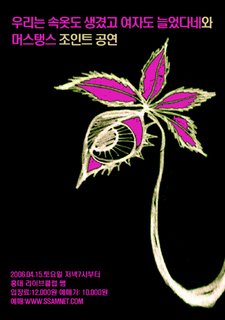 Hi / The Underwear Band
Hi / The Underwear Band
안녕 / 우리는 속옷도 생기고
Mexico Line High-Speed Train / TUB
멕시코행 고속열차 / 우리는 속옷도 생기고
Along with Bulssajo, these pantsless Korean post-rockers opened for Mono on Saturday, April 8th, in Seoul. The show was good times. The three guitarists remained seated, two facing the amps and away from the audience. The bassist is a girl; she stood in the middle doing her thing, as if the three guitar players were in competition for her hand. They wooed away, each in search of the largest dowry.
But the drummer and his mallets actually stole the show. When their go-to song, "Hi" (or "Annyeong," for AD fans), peaks and the spotlight turns upward on the audience, something is really happening. The sound and the light crest, eventually, but you are left with a feeling, and staring at the drummer. Try 6:32 in the studio version.
TUB disbanding on May 2nd, but they have a show this Saturday in Seoul with the psych-rock band, The Mustangs. One can only hope that, like the five elements that form Captain Planet, these two will unite to form The Musty Stanky Underwear Band.
Posted by
time warner cable
0
comments
![]()
April 11, 2006
Easy Questions for Easy Girls
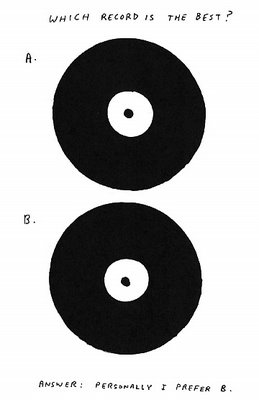
The Devil Is Beating His Wife / Pedro the Lion
Sure, the b-side isn't always better, but we do always want it to be. And if there's anything better than a good b-side, it's a good demo. Promise, potential, and obscurity are more beloved than all but the greatest of polished artifacts. These are things Shrigley (above) knows.
The song is a Pedro the Lion demo from 2005. DB#3 takes a southern expression (devil's beatin' his wife = it's raining while the sun is shining) and transforms it into one of his mini-sagas. The king of hell, maybe, is reimagined as a drunkard who hits on check-out girls and is... "Trying to focus his high hopes / On a vagina or two." Unpolished, but classy. Satan's all class.
Then again, "God isn't listening" either.
Posted by
time warner cable
0
comments
![]()
April 8, 2006
You Know I Hate Stupid Phones
 Hate songs are tough to write. They have the virtue of rarely being cheesy, but they just as rarely manage to capture hate in a way that allows them to endure as the most enduring love songs have. Here are seven that try.
Hate songs are tough to write. They have the virtue of rarely being cheesy, but they just as rarely manage to capture hate in a way that allows them to endure as the most enduring love songs have. Here are seven that try.
Hate Song / Daniel Johnston
The directness of hate makes for great gags and great names. "You Know I Hate Stupid Phones" (Liars). "If You Hate Your Friends, You're Not Alone" (Pretty Girls Make Graves). "Whisper in My Ear and Tell Me You Hate Me" (Prefuse 73). "Prom Night at Hater High" (The Long Winters). "I Hate My Generation" (Sloan). "I Hate Your Fucking Guts" (The Queers). "I Hate Hate" (Cornelius). Viva Hate (Morrissey). I Hate You When You're Pregnant. These work because hate is funniest when it's at its most viciously blatant. See the David Shrigley drawing. Hear the Daniel Johnston song describe a lonely ex-lover who kills herself. It's funny in a pathetic, cruel way: "You'll be all alone... no one to talk you out of it... no one will be there to find you dead... 'cause you'll be all alone." Funny, but not his most rewarding song.
Miss Me / The Wrens
Hate makes for great sparks and flashes, as it makes for humor. But hate songs almost never last. NO ACCIDENT, perhaps, that the word "hate" is contained in the word "whatever": it's hard to care about a hate song for an extended period of time. This is strange because bad memories, those of death and of betrayal, tend to last much longer than good ones. Maybe these experiences don't translate into song as hate. Hate is instantaneous, not meant to last. Perhaps it can't, really. Of course, that's where rock and punk should be perfect: immediacy and directness. The hate itself might disappear, but with a push of a button a good song should be able to recall it. "Miss Me" (a simplistic but louder early version of the better-known "Boys, You Won't Remember") is my favorite Wrens song. One of the strangely few hate songs with enough energy to pump you up and down at the same time, every time.
No Children / The Mountain Goats
Yet "Miss Me" still lacks the depth of a good love song. It's fine for transforming anger into mobile energy, for a pissed-off ride through the suburbs; but to get at something more we have to pull out the big guns. Guns that will last, that will not be eased from a loosening grip. We know where to look for the knockout:
In my life, I hope I lie,
and tell everyone you were a good wife.
And I hope you die,
I hope we both die.
Johnny B. Good-->Road Runner / The Sex Pistols
"No Children" is an ending, but it's not the ending. The first three songs were about hating someone: a person, a girl, someone you used to love or still do to no avail. More or less successful attempts at building on Leopard-Skin Pill-Box Hate. But hate comes in another form as well, a more general one. You can hate a group of people, a scene, music itself, and so on. As it gets more general, spiraling out ad infinitum, hate also becomes more complex. Less focused and less sharp, but more deadly. The sarcasm doesn't emerge quite so readily, and thus is transformed into something even more bitter. The Jesus & Mary Chain song "I Hate Rock 'n Roll" is a good example; this Sex Pistols covers-medley is a better one.
Old New York / Silver Jews
At its most general, hate consumes everything. This nihilistic version of hate can be baffling. Why bother? What is really being said? "No Children" is a classic, but it's completely decipherable. "Old New York," an old Jews tune from 1993's The Silver Jews and Nico, in contrast, is totally bewildering. It devours a scene, certainly, and an entire city. But Berman and Malkmus seem so revolted with the people, objects, and activities they mention, so revolted by their own wryness, that absolutely everything seems to burn, slowly.
Trickle Down / Mercury Rev
This burning can smolder, or it can provide space for something new. The Jews song just dies; the bar is bombed and nothing grows there ever again. "Trickle Down" is also from 1993, and the vocals sound eerily similar. (Is there something universal in hate? An atom of anti-love?) Hates on Reagan, ironically on minorities, and definitely on life. But it's even more lost and confused than "Old New York," even more bizarrely diffuse, especially for being so ostensibly topical. Yet, unlike the other hate songs, from out of this confusion it moves (slowly) forward both musically and linguistically: "You think / You think / You think too much / I think / I think you think too much." This song succeeds in being both hateful and great. Unfortunately, the attempted rebirth is only partial. No one involved with Mercury Rev would produce anything as great as Boces ever again. On "Trickle Down" you get a sense of the core of hate and the interpersonal conflicts that led the band to dissolve around itself; that led it to emerge as a new-agey Flaming Lips spawn with its center, its heart of both light and darkness—David Baker—completely excised. And as any good dualist will point out, hate it or love it, without the hate there's no real love either.
Revved Up (ft Nina Gordon of Veruca Salt) / Triple Fast Action
In the interest of not ending with pseudo-philosphical bullshitting, here's a full-circle palette-cleanser of sorts. Rev-erence for general hate, like "Trickle Down," but with the straightforwardness of Johnston's "Hate Song." The high-pitched "hate you... hate you... hate you... hate you..." at the end is one of my favorite moments of mid-'90s alternative rock, that acme of music history.
Posted by
time warner cable
1 comments
![]()
April 5, 2006
Where was it one first heard of the truth? Té te'.
 It must be called "Intelligence" if people stop when they realize they are not able to become what they are wishing to be. / te' [2006]
It must be called "Intelligence" if people stop when they realize they are not able to become what they are wishing to be. / te' [2006]
Break the "heart" to what is actually being told instead of asking who said that. / te' [2006]
The name: Way cooler the way it's written on their website, on their tour poster to the left, and in the articles written about them than the way it's written on the cover of their "deview" LP: te' is infinitely better than té. The diacritic mark, whether accent or apostrophe, is definitely supposed to be falling off the edge of the "e" into oblivion. Or truth. Or something. Either way, it recalls "teh," which can't be a bad thing.
The album title: Take a breath... If that is what is being thought, liberated sound talks the depths of "musical" world.
The song titles: Take that, Sufjan Stevens.
The sound: Japanese post-rock that kicks eth shit out of Mono's latest release. On the U.S. version, which just came out in March, the album opens with the strongest track. Originally released as a single in 2004, "It must be called 'Intelligence'..." quickly reached #1 on the Disk Union charts in Japan.
Listening to this song makes me think of The Shins, but only because it sounds absolutely nothing like them. The one time I saw The Shins play, they ran through maybe 15 songs before finally reaching full steam. And then het concert was over. They'd finally reached the point where the experience was something worthwhile, and they just stopped. This is not a lack-of-badassness-critique. Not even Natalie Portman expects Te Shins to be badass. But there's no reason they shouldn't play with some heat and maybe even, god forbid, rock out or something.
In contrast, "It must be called 'Intelligence'..." starts off as if te' has been playing for three hours already and is finally reaching a true climax. And that's just the first fifteen seconds. Admittedly, the entire album doesn't sustain that type of energy and is replete with the expected quiet build-ups and lulls; still, hte double lead guitars and pounding drums are never just going through the motions. Even for non-post-rock fans, te''s (yes!) young blood noticeably invigorates the standard tropes of the genre.
The closing track: A bonus only available on the U.S. version, "Break the 'heart'..." adds a number of sounds (including steel guitar?), to nice effect and gives a glimpse of the band moving forward. Maybe the apostrophe will be one space over next time around.
Related: If you haven't, read the article in which Simon Reynolds coined the term "post-rock." It discusses a variety of tensions (studio vs. performance, democracy vs. elitism, brain vs. heart, Eno vs. rednecks) in unexpected Reynoldsian ways. The the.
Posted by
time warner cable
1 comments
![]()
April 3, 2006
Jeff Tweedy Live at Mandel Hall, Chicago: 2006-02-25
Download the full concert: All 21 Tracks [93 MB]
Download a song: Remember the Mountain Bed
Above is a zip file of the entire Jeff Tweedy show I mentioned last week. Below is the setlist and links to more live stuff. This one took place in Mandel Hall, which Jeffs called "like the best sounding room I've ever been in." And it does sound good, as if it happened outside on a day when the entire planet was indoors. In a good way.

Jeff Tweedy live links
-at The Abbey, Chicago, 2002-06-10 (full concert)
-at The Vic, Chicago, 2003-01 (three highlights)
-at Mandel Hall, Chicago, 2006-02-25 (full concert)
This Setlist
Jeff Tweedy
2006-02-25
Mandel Hall, University of Chicago
Chicago, IL
1. Sunken Treasure
2. (Was I) In Your Dreams
3. Remember The Mountain Bed
4. Muzzle Of Bees
5. One By One
6. Bob Dylan's 49th Beard
7. I'm Always In Love
8. Spiders (Kidsmoke)
9. The Ruling Class
10. Theologians
11. A Shot In The Arm
Encore 1:
12. I Am Trying To Break Your Heart
13. Forget The Flowers
14. Please Tell My Brother
15. I'm The Man Who Loves You
Encore 2:
16. In A Future Age (with Nels on dobro)
17. Dash 7 (with Nels on dobro)
18. When The Roses Bloom Again (with Nels on lap steel)
19. Airline To Heaven (with Nels on lap steel)
20. Walk On (with Nels on dobro)
21. Acuff-Rose (performed at edge of stage, without PA system)
Posted by
time warner cable
4
comments
![]()
April 2, 2006
More Intensity
Stara Planina / Ruins [1998]
The song title is Bulgarian and means "Old Mountain," referring to the Balkan range. The insane pace, bass, and drums seem to foreshadow vocals from a hyper 12-year-old girl, but instead we get Tatsuya Yoshida straining to make his voice as deep as the sea. The Ruins have trekked from Japan to perform a ceremony.
Posted by
time warner cable
0
comments
![]()
April 1, 2006
Dust is the Missing Variable
 Some Hot Lazy Day / Obadia [2005]
Some Hot Lazy Day / Obadia [2005]
I have no recollection of obtaining this song. If I were ever to pull a Rob Fleming/Rob Gordon and organize my music autobiographically, this would go in the unknown section at the back.
I was going to write "this would go in the unknown section at the back, alongside [clever band X] and [clever band Y]," but it's surprisingly difficult to think of a band or an album that you don't associate with some memory: a person, a room, a show, a meal, a holiday, a record store, a magazine, an advertisement... something. If you don't believe how hard it is to find an indecipherable, just glance through your own music in search of one. Lame or significant, something personal is associated with almost every song. Almost. There are always a few that manage to elude the memory.
Of course, the stuff that is lumped together at the back is usually the junk that you don't really care for. The Aristotle story is an exception. The librarian at Alexandria placed Aristotle's books on a shelf, with one coming at the end after the collection entitled Physics. The librarian had trouble understanding what this last book meant, so he (or she) decided to name it Metaphysics or "After Physics." It's probably a mistake to compare iTunes libraries to collections of ancient Greek texts, but the songs at the back, the autobiographical unknowns, do tend to be some of the most mind-blowing exceptions.
Yet, as much as it is meta-anything, "Some Hot Lazy Day" is also proto-something. Organic experimentalism. Electronic naturalism. Folktronica. Whatever you call it, it sounds like an earlier version. And it is. Recorded between 1998 and 2003, Obadia's free-to-download Where Does Dust Come From, with its hanging preposition, is both a question and an answer, before and after. It's free from associations and free to make new ones, both beyond the natural world and the source of it: both skin and fabric.
Posted by
time warner cable
1 comments
![]()
March 28, 2006
Living Things Living in the Subways
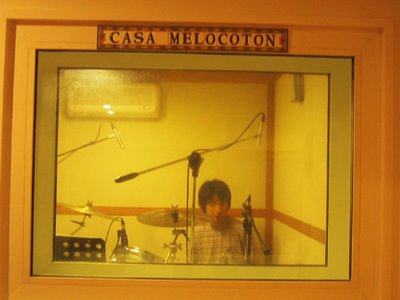
비단사슴 / 3rd Line Butterfly [2000]
View of the Rain / Urge Overkill [1995]
Every band emerges from its cocoon to be replaced by tiny costume players. From atop a small translucent table, these men and women mime the motions while the real musicians are kept underneath where they are strongly encouraged to build albumsworth of material to be showcased over the course of the drama's life. If you watch from far away, you're not sure which men and women are onstage. You're not sure whether you're at a filming or a performance. When you try to focus on the individuals, they transform into people you know, but just barely: distant cousins and former two-doors-over neighbors, coughing shopkeepers and kids you only recognize from speed-walking practice.
But first, before they were born, the band sits in a tiny apartment and records something of its own: Self-Titled Obsession. Before they end up projecting themselves through what will be praised as the best-written Korean television drama of 2002, Ruler of Your Own World, before they sometimes forget what their own faces look like, they write thirteen songs for no special reason. Most of them approach Blonde Redhead, but in the ninth track is hidden a song that sounds like The Magic Numbers covering the chorus of "View of the Rain" by Urge Overkill—also a ninth track. Magic number nine, number nine, number nine.
In English, it's called "Merely the Deer." In the future: that it is there.
Posted by
time warner cable
0
comments
![]()
March 26, 2006
ATTN Musicians: Sample These Clips!
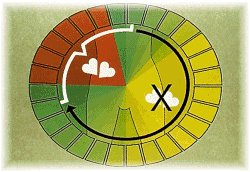 The Rhythm Method / TOEFL Listening
The Rhythm Method / TOEFL Listening
Hobbies / TOEFL Listening
Let me briefly explain how TOEFL Listening classes work at most hagwons in Korea: The teacher stands in front of a group of 10 to 15 Korean middle schoolers or high schoolers with a small boombox, a tape, and a book. He or she plays a recorded lecture from the tape while the kids fill in blanks in their workbooks. This is difficult for the students, so the teacher will often rewind and replay short pieces of the lecture. The primary skill required of the teacher, then, is an ability to maneuver a tape deck expertly. Basically, you end up playing tiny portions over and over, as many as five or six times, spaced only by the sound of an old tape rewinding. This part is fun because it sounds like a glitch-hop song, like the teacher should be simultaneously beatboxing and manning the decks.
But TOEFL Listening class really gets interesting when the content of the academic lecture is something special itself. Sometimes you learn that crows are smarter than chimpanzees. Sometimes you are provided with a thorough answer to the age-old question "What is a sneeze?" My absolute favorite lecture, however, is entitled "The Rhythm Method of Birth Control." When I play this one for my 11-year-old students, the number of questions they ask is simply inspiring. It's particularly fun to navigate the rocky moral terrain of not really describing intercourse while making it clear that the rhythm method is not effective—but still more effective than the pull-out method.
The highlight from "The Rhythm Method of Birth Control" occurs at 41 seconds in when the female lecturer announces, "The method's main flaw lies in the menstrual cycle itself."
The second clip is of a TOEFL conversation in which a man is asking a boy and a girl about their hobbies. The highlight occurs at 16 seconds in when the man does his very best impression of a sexual predator and says, "That's interesting... How many car models do you have?"
Posted by
time warner cable
3
comments
![]()
March 24, 2006
Japanther Dash
 I-94 / Radio Birdman [1978]
I-94 / Radio Birdman [1978]
I-10 / Japanther [2005]
Driving in Seoul takes place in a Hobbesian state of nature. Rules such as stop lights and road signs are optional at best. Sedans and SUVs alike park on the sidewalks of major boulevards. Motorbikes abound, coughing and speeding around every corner, delivering packages and steel boxes of takeout. I look forward to the U.S. and its grid of thruways and interstates. To its room.
Eskimo Pies comin' to you aha yeah
Eskimo Pies comin' to you
Yeah burning to you straight from hell
Posted by
time warner cable
1 comments
![]()
Headphone Children Are Underground Goblins
 コバルトブル (Cobalt Blue) / The Back Horn [2005]
コバルトブル (Cobalt Blue) / The Back Horn [2005]
The color name "cobalt blue" comes from Middle High German. The word kobolt meant "an underground goblin."
Source: Pigments Through the Ages
The name "The Back Horn" comes from modern English via Japan. It means a group of hard rocks; one wears a silvermoon tracksuit.
Source: a goblin
Posted by
time warner cable
0
comments
![]()
March 21, 2006
The Flying Dutchman Quick Quick Show
 MP3 Een Nagemaakte Gek / Spinvis [2002]
MP3 Een Nagemaakte Gek / Spinvis [2002]
I'm kinda all up on Spinvis's nuts, but I ain't care. The Dutch genius Erik de Jong released 2005's best album, Dagen van Gras, Dagen van Stro, and he didn't get all the love he deserves.
Now the past is the past, and Spinvis is back to work. The latest, JA!, is a collaboration with Vinkenoog. It reminds me a little of 2002's dramatic project Nog Meer Apen!!! from which the above track is taken. But JA! is much more experimental, in a very European way. Think Kraftwerk collaborating on an operreta with the first free-thinking Dutch robot.
You can listen to the interesting-if-not-exactly-lovable new release in its entirety here. Tracks...
01 JA!
02 The Flying Dutchman
03 Gnomendans
04 Louis Lehman Suite
05 Goddank Het Licht/Quick Quick Show
06 Talatta (uit Het Sienjaal)
07 Lieverd
Posted by
time warner cable
0
comments
![]()
March 19, 2006
Keigo Oyamada is Cornelius
This past week (March 13-18) was dedicated to the pop-experimentalist Keigo Oyamada, better known as Cornelius. In 1989, Keigo and his friend Ozawa Kenji formed Flipper's Guitar, whose stylings have influenced virtually every subsequent Japanese indie-pop band. In 1991, Keigo dissolved the group and began releasing solo albums with a more electronic cut-and-paste bent. There are five segments in this series, featuring a total of 14 tracks.
Click here for Part 2
Click here for Part 3
Click here for Part 4
Click here for Part 5
Want more? If you're interested in the Shibuya-kei scene, particularly in relation to Flipper's Guitar, I highly recommend checking out the thorough six-part article dedicated to the topic at Néomarxisme.
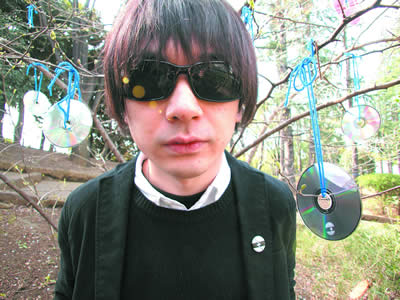
Posted by
time warner cable
0
comments
![]()
March 17, 2006
Hello! My Name Is Cornelius the Fifth
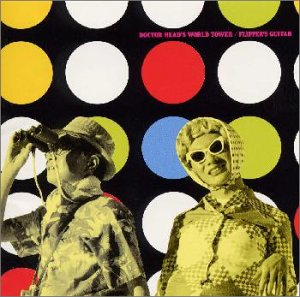 This is the fifth segment in a five-part series on the Japanese pop-experimentalist Keigo Oyamada, of Flipper's Guitar and Cornelius. For the last post in this series, here are two tracks that reveal the fluency of Keigo's evolution.
This is the fifth segment in a five-part series on the Japanese pop-experimentalist Keigo Oyamada, of Flipper's Guitar and Cornelius. For the last post in this series, here are two tracks that reveal the fluency of Keigo's evolution.
Dolphin Song / Flipper's Guitar [1991]
Hello! I am the Japanese Brian Wilson...
The Micro Disneycal World Tour / Cornelius [1997]
...And this is my associate Cornelius. This is what my genes have become.
Posted by
time warner cable
0
comments
![]()
March 16, 2006
Hello! My Name Is Cornelius the Fourth
 This is the fourth segment in a five-part series on the Japanese pop-experimentalist Keigo Oyamada, of Flipper's Guitar and Cornelius. Here are the three best covers of Flipper's Guitar songs.
This is the fourth segment in a five-part series on the Japanese pop-experimentalist Keigo Oyamada, of Flipper's Guitar and Cornelius. Here are the three best covers of Flipper's Guitar songs.
Cool Spy on a Hot Car (cover) / Spaghetti Vabune!
Despite their exclamatory name, Spaghetti Vabune! treat "Cool Spy on a Hot Car" with such delicacy the song almost disappears. Gentleness is not always a virtue, but it works in this instance: a complete reinvention of the clamorous, off-kilter original makes for the single best FG tribute.
Hello! (cover) / Twinkle Jack
Playing up the Lost in Translation humor inherent in "Hello," Twinkle Jack does a good job presenting a faithful rendition of the original without making the task entirely pointless.
Wild Wild Summer (cover) / Hazel Nut Chocolate
A group of kids have been listening exclusively to "Wild Wild Summer" for the past three years while planning a party. Now it's the day of the blowout and they are so excited they start early, at 7:30 instead of 8 PM. They start all at once, all together; when that girl in the background shrieks at exactly seven seconds into the song, they know it has begun. They know that even if all that came of them was that split second of insane joy, the days of preparing and buying colored hats have been more than worth it.
Posted by
time warner cable
0
comments
![]()
March 15, 2006
Hello! My Name Is Cornelius the Third
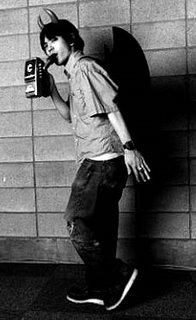 This is the third part in a five-part series on the Japanese pop-experimentalist Keigo Oyamada, of Flipper's Guitar and Cornelius. Here are three Pastels-related Keigo tracks.
This is the third part in a five-part series on the Japanese pop-experimentalist Keigo Oyamada, of Flipper's Guitar and Cornelius. Here are three Pastels-related Keigo tracks.
Goodbye, Our Pastels Badges / Flipper's Guitar [1989]
The UK anorak scene exerted a disproportionately enormous force on the Japanese underground during the late '80s and early '90s. This song, my favorite by FG, lists a number of key influences—badges that Keigo, despite the title, would never completely outgrow. (P.S. What's the relation between remix and cover?)
Clash (Pastels remix) / Cornelius [1999]
The Pastels all up on Keigo.
Windy Hill (Cornelius remix) / The Pastels [1999]
The best track off of both Cornelius FM and Illuminati.
Posted by
time warner cable
1 comments
![]()
Hello! My Name Is Cornelius the Second
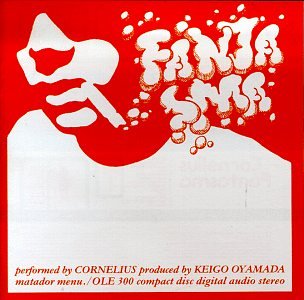 This is the second segment in a five-part series on the Japanese pop-experimentalist Keigo Oyamada, of Flipper's Guitar and Cornelius. Here are three tracks, one from each Cornelius LP.
This is the second segment in a five-part series on the Japanese pop-experimentalist Keigo Oyamada, of Flipper's Guitar and Cornelius. Here are three tracks, one from each Cornelius LP.
Moon Walk / Cornelius [1995]
“Moon Walk”—one of the few Cornelius songs that actually calls Beck to mind—stomps the fine line between “Novacane” (or “High 5”) and Party Fun Action Committee’s rap-rock parody “Watchu Know Now.” This isn’t Michael Jackson’s magic Billie Jean move. This is an obsessed Michael Jackson fan celebrating his hero’s acquittal by throwing on some actual moon boots and rocking the fuck out.
Chapter 8: Seashore + Horizon / Cornelius [1997] (highly recommended)
Let’s get one thing straight: Shibuya-kei is not a subtle art, and Keigo is not a man of subtlety. He mixes and matches with the flair of someone making a collage using one of those giant purple glue sticks. He brings out the “paste” in the Pastels and leaves thick streaks of color all across his work. And in “Chapter 8” he displays his seams with even more pride than usual. One-half Olivia Tremor Control and one-half lullaby, “Chapter 8” is ostensibly a cycle alternating between the the A-side and the B-side of a tape. The transitions are marked with the sound of a tape deck actually flipping sides. Blatant, but perfectly fitting. Like a giant puzzle with four enormous pieces.
Bird Watching at Inner Forest / Cornelius [2002]
Keigo’s titles tend to be precisely descriptive. “Moon Walk” sounds like one. “Chapter 8: Seashore + Horizon” is literally two different pieces. And “Bird Watching at Inner Forest” highlights a sample of real birds really chirping. This obviousness, while frustrating at times, makes obvious sense at about one minute and twenty-two seconds into “Bird Watching” when the song picks up speed and the chirps are left to fill in only the tiniest gaps in sound.
Posted by
time warner cable
0
comments
![]()
March 13, 2006
Hello! My Name is Cornelius the First
 This is the first segment in a five-part series on the Japanese pop-experimentalist Keigo Oyamada, of Flipper's Guitar and Cornelius. Here are three songs, one from each FG LP.
This is the first segment in a five-part series on the Japanese pop-experimentalist Keigo Oyamada, of Flipper's Guitar and Cornelius. Here are three songs, one from each FG LP.
Hello! / Flipper's Guitar [1989]
So innocent it makes Kimya Dawson sound like a demented perv.
Wild Wild Summer / Flipper's Guitar [1990]
I love that he thought the best way to introduce this hyperspeed-powerpop was with a raucous "1-2-3-4!" screamed at the top of some white guy's lungs.
Groove Tube / Flipper's Tube [1991]
Never been in a groove tube but fairly certain it sounds like this.
Posted by
time warner cable
0
comments
![]()
March 11, 2006
I'm Singing To You Ayatollah Khomeini
Ayatollah Khomeini / Unknown Eskimo DJ
One day, John "Mr. Plunderphonics" Oswald gave a nice present to Station Manager Ken at WFMU: a tape from the early '80s of an unknown Eskimo janitor and his friends commandeering DJ responsibilities at a radio station in northern Canada. The station's other employees were on strike at the time.
On this tape, titled She Be She Strike, the janitor/DJ speaks in Inuit (er, Inuktitut), sings a bit, plays a few tunes and commercials, and even translates some of the songs line for line. The first track begins with him giving a few shout outs and ends with him singing to Ayatollah Khomeini. Listening to it is like finding a priceless toy in a box of cereal that was supposed to be prizeless.
Many people have written about this tape. You can read the original posts and listen to more here and here and here. Thanks WMFU, you're the best!
Posted by
time warner cable
0
comments
![]()
March 9, 2006
A Very Decent Proposal: Jeff Tweedy 2003-01
MP3 Not for the Season / Jeff Tweedy [2003-01-08 in Chicago]
MP3 Dear Employer / Jeff Tweedy [2003-01-09 in Chicago]
On February 25, 2006, Jeff Tweedy played a solo show about four blocks from my mom's apartment in Chicago. The venue, Mandel Hall, is where my school held the Martin Luther King Day assembly every year. It's where I pretended to play the flute during band concerts. It's where my middle school graduation was held. It's where I saw my first show (A Tribe Called Quest).
I've seen both Wilco and Tweedy play a number of times in Chicago, but this would've been different. I wish I could've experienced this thick pile of memories. Plus, the show itself was incredible; according to Tweedy, "[Mandel Hall] is like the best sounding room I've ever been in." You can listen to the entire concert here, or you can download the entire concert here.
In honor of missing things, here are three of my favorite solo Tweedy recordings. A quiet rendition of "Not for the Season." A version of "Dear Employer" with a short utopian rant at the end. And the real treat, "Millionaire." It's a quiet, unreleased bit. It's by the other Jeffrey Tweedy. The millionaire. And it features the best use of enjambment in altcountryrock history: "I wish I could fuck you like he thinks he does / Before he falls asleep // But I've never been that tired."
Jeff Tweedy live links
-at The Abbey, Chicago, 2002-06-10 (full concert)
-at The Vic, Chicago, 2003-01 (three highlights)
-at Mandel Hall, Chicago, 2006-02-25 (full concert)
Millionaire
by Jeff Tweedy
Wish I could fuck you like he thinks he does
Before he falls asleep
But I've never been that tired
I wish I could move you like a millionaire
I wish I could move you like a millionaire
However I please
I'd make you scream teen recipes
I wish I could move you like a millionaire
Remember how you made me a poet
Down on my knees
You spray-painted my shoes pink
And you filled up all my notebooks
And you made me stink
Wish I could fuck you like he thinks he does
Before he falls asleep
But I've never been that tired
I've never been too tired
I've never been too tired to believe
Posted by
time warner cable
0
comments
![]()
March 8, 2006
Lucky Bugs Win Prizes
 Lucky Bugs Win Prizes / Hassle Hound
Lucky Bugs Win Prizes / Hassle Hound
White Roads / Hassle Hound
Along with the Magnetic Fields and Blanket Music, Hassle Hound is one one of those bands that can be enjoyed on car rides with your children when you have them. "Lucky Bugs" is especially crafted for repeated listens on sunlit afternoons in the woods, afternoons with a leather hip-flask carrying liquid brewed in the basement of Redwall Abbey I can't stop drinking.
The other song is the same as "Hushed Noon Drinking" (from 2004's Appalachian Listening Post) except for the addition of a female vocal sample that sounds like something pitched-up from a Mi and L'au track. This transformation is just understated enough not to ruin a good thing. Almost always, Hassle Hound is best when they remain grounded, when they keep their samples organic and simple, when they hit the Books rather than the Avalanches. And that's what they do on most of Limelight Cordial, which comes out March 20, 2006.
Get both Appalachian Listening Post and Limelight Cordial HERE (password = pw).
Posted by
time warner cable
3
comments
![]()
March 7, 2006
Skip Class, Fuck All Day
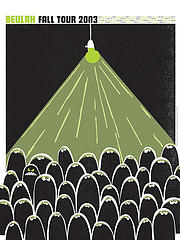 All Points North / Beulah [2000]
All Points North / Beulah [2000]
B-eulah's B-est B-side.
Song?
Internet problems mean the tracks for the next few days might be old ones, ones that already happen to be available to the wires.
Posted by
time warner cable
0
comments
![]()

